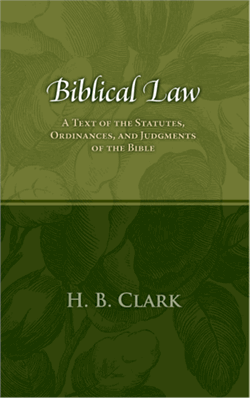For years, prominent Christians have been critical of applying Old Testament law to the New Testament era even though Jesus (Mark 7:1–9) and the Apostle did (Rom. 13:8–10; 1 Cor 5:1–2; 9:9; 1 Tim. 1:6–10; 5:18). It’s not always clear how the OT law might apply in the New Testament, but there is no justification to say that NT writers don’t often apply it (2 Tim. 3:16–17).
Charles Colson, who served as Special Counsel to President Richard Nixon from 1969 to 1970 and was caught up in the Watergate scandal and served seven months in federal prison on Watergate charges, became an evangelical Christian in 1973. He wrote the bestseller Born Again in 1975 and worked tirelessly on prison reform through the non-profit ministry Prison Fellowship and later Prison Fellowship International.

By This Standard
God's Law is Christianity's tool of dominion. This is where any discussion of God's law ultimately arrives: the issue of dominion. Ask yourself: Who is to rule on earth, Christ or Satan? Whose followers have the ethically acceptable tool of dominion, Christ's or Satan's? What is this tool of dominion, the biblically revealed law of God, or the law of self-proclaimed autonomous man? Whose word is sovereign, God's or man’s?
Buy NowHe was critical of Christian Reconstruction and its approach to biblical law. He expressed his criticisms on the Bill Moyer’s God and Politics segment dealing with Christian Reconstruction that first aired in December 1987. Colson’s book Kingdoms in Conflict briefly addresses Christian Reconstruction. A comparison of “theonomy” in Kingdoms in Conflict with statements about the law in an article published in Transforming Our World, with the title “The Kingdom of God and Human Kingdoms,” makes one wonder if Mr. Colson either was not aware of Reconstruction distinctives or was unwilling to study them thoughtfully. We will never know since Colson passed away at the age of 80 in 2012. Consider the following:
Recently I addressed the Texas legislature…. I told them that the only answer to the crime problem is to take nonviolent criminals out of our prisons and make them pay back their victims with restitution. This is how we can solve the prison crowding problem.
The amazing thing was that afterwards they came up to me one after another and said things like, “That’s a tremendous idea. Why hasn’t anyone thought of that?” I had the privilege of saying to them, “Read Exodus 22. It is only what God said to Moses on Mount Sinai thousands of years ago.”[1]
Consider some of the other laws in Exodus 22:
• You shall not allow a sorceress to live (v. 18).
• Whoever lies with an animal shall surely be put to death (v. 19).
• He who sacrifices to any god, other than to the LORD alone, shall be utterly destroyed (v. 20).
Colson did not take the legislators to natural law or New-Testament-only law. Rather, he referred them to the Mosaic legislation, a set of laws that many Christians tell us were unique to Israel and have little moral relevance to the New Covenant era. These laws are not for the Gentile nations, say Scofield and company. According to dispensationalists, they are Israel-specific case laws. Wayne House and Thomas Ice, who are not theonomists, write like mini theonomists:
The Christian is to love the law of God. Grace does not free the believer from obedience to the will of God. However, Christians are not under the expression of the law as it was given to Israel. Instead, we may use the Mosaic legislation as examples of how we may respond individually and corporately; we main gain wisdom from it. Christians are, however, to obey the will of God as it is expressed in the New Testament — the law of Christ — and the law revealed in the Adamic and Noahic covenants.[2]
Even Ted Koppel seems to agree with Colson and (maybe) Reconstructionists against (maybe) dispensationalists:
What Moses brought down from Mt. Sinai were not the Ten Suggestions. They are commandments. Are, not were. The sheer brilliance of the Ten Commandments is that they codify in a handful of words acceptable human behavior, not just for then or now, but for all time. Language evolves. Power shifts from one nation to another. Messages are transmitted with the speed of light. Man erases one frontier after another. And yet we and our behavior and the commandments governing that behavior remain the same.[3]
There’s no way to escape all of God’s law even if you are a “New Testament Only Christian.” The goal is to determine how to interpret and apply it.

Biblical Law
Biblical Law is one of the most comprehensive studies of the application of the Bible to contemporary life that one will ever come across. For Clark, law means a rule or a body of rules for the government of human life, prescribing rights and duties and regulating conduct. As you can see, Clark's definition of law is comprehensive. Law is not just for the individual; it's for all of life, including the civil sphere of life. Clark's extensive footnotes—thousands of them referencing the Bible and court cases—show how often the Bible has been used in contemporary lawmaking.
Buy Now[1]Charles Colson, “The Kingdom of God and Human Kingdoms,” Transforming Our World: A Call to Action, ed. ed. James M. Boice (Portland, OR: Multnomah, 1988), 154–155.
[2]House and Ice, _Dominion Theology: Blessing or Curse? An Analysis of Christian Reconstructionism _(Portland, OR: Multnomah Press, 1988), 118–119. For a comprehensive critique of this book, see Greg L. Bahnsen and Kenneth L. Gentry, House Divided: The Break-Up of Dispensational Theology (Tyler, TX: Institute for Christian Economics, 1989).
[3]Ted Koppel, The Last Word, Commencement Address at Duke University, Durham, North Carolina (May 10, 1987). Quoted in Robert H. Bork, The Tempting of America: The Political Seduction of the Law (New York: The Free Press, 1989), 164.

